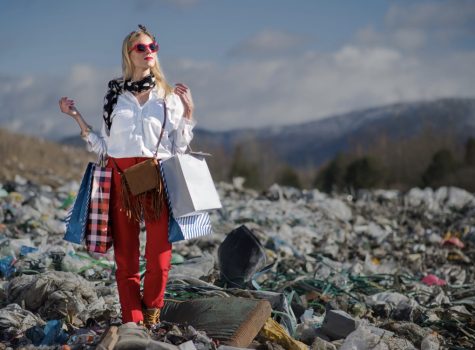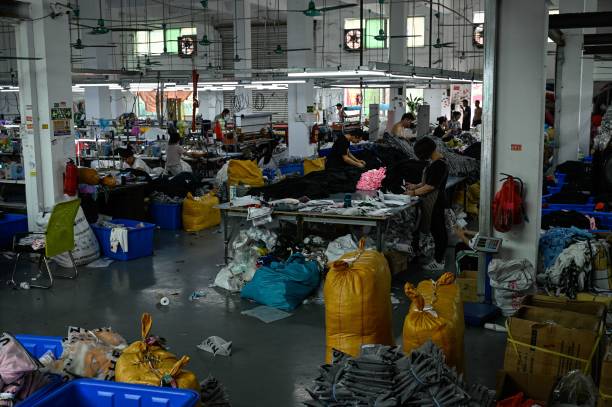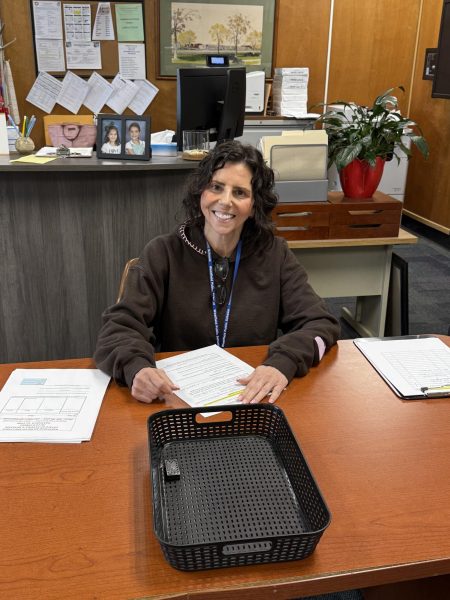Fast fashion needs to slow down
Workers make clothes at a garment factory that supplies SHEIN, a cross-border fast fashion e-commerce company in Guangzhou, in Chinas southern Guangdong province on July 18, 2022. (Photo by Jade Gao / AFP) (Photo by JADE GAO/AFP via Getty Images)

Have you ever wondered how the clothes you buy make it into the stores you love? With ever changing style trends, companies in search of a profit are forced to constantly mass produce new clothing to keep up with demand. With the rise of social media and influencer culture, people rush to buy stylishly advertised items to keep up with trends. However, the publicity is only temporary, and once a new outfit cycles through the internet, a new craze is found and those once popular clothes disappear in a matter of months. So how do companies get their clothes to the shelves fast enough to keep up with their customers? The answer is fast fashion. This means that companies are working quickly to produce clothes that adhere to these trends. Companies such as Shein, H&M, Zara, and Nike are all fast fashion. The production by these companies is detrimental to the environment and creates harsh working conditions for their employees.
Companies like Shein for instance, use toxic chemicals, harmful dyes, and synthetic fabrics to manufacture their clothes. The material used is also filled with lead, pesticides, and plenty of other chemicals. These contaminants frequently make their way into water supplies, which is extremely unsafe to people’s health. These garments don’t often break down, but instead pile up in landfills, releasing poisonous fumes. The fashion industry’s carbon footprint is enormous, reaching a similar level to air travel and even oil companies. These quick companies continue emitting damaging substances, as they have constant customer demands from people like eighth grader Lily Rotella who stated, “I buy new clothes a lot, like every two weeks.”
Horrible quality clothes aren’t the only issue with these companies. These brands also take advantage of their employees’ desperateness for work. Parents and even children are constantly working, including consistent unpaid overtime in order to support their families. Most work 14-16 hours a day and seven days a week. In Bangladesh, a country where sweatshops are prominent, workers are paid a completely unlivable 33 cents an hour. On this wage, it is impossible to pay for basic necessities so workers are forced to work unimaginable hours in order to make enough money even to eat. Lots of sweatshops are located in poor nations with weak labor laws and barely any government control, so their working conditions are unhygienic and unsafe. Employees in these factories are often abused both verbally and physically by their bosses.
Many customers are not aware of the consequences of buying the clothes that they do. Popular companies may seem like they should be ethical because they are supported by so many, but this is not always the case. Plenty of common brands use fast fashion and sweatshops to produce their clothes. This includes Nike, Shein, UNIQLO, GAP, Forever 21, Fashion Nova, Zara, H&M, and a number of other brands. Small businesses, local stores, and other non mainstream clothing companies are always options for outfits as they use more respectable operations. They often use higher quality materials which allow the clothes to look great and last even longer than big brand items. About these larger brands, seventh grader Tziona Gras agreed, “I don’t trust companies like Shein, they tend to have bad quality.”
Some are already supporting the more justified clothing options. Language Arts teacher Ms. Ciampa set a great example when she explained, “I personally don’t buy from Shein. I used to, but I noticed their quality wasn’t good, so I decided that it’s better to invest in clothes that will last. I do shop at small businesses in Hoboken, where I live. I shop at a place called Poppy and Stella.”
It is essential to follow in Ms. Ciampa’s footsteps by supporting local stores. Eliminating fast fashion pieces from the wardrobe is imperative to keep the earth clean and eliminate unsafe work conditions. If there is no demand, these companies will slow down their unnecessary production of clothes which will erase the fast fashion industry and its negative impacts on various aspects of the world.








Kiki Hang • May 10, 2023 at 6:09 am
Basically there are 2 main consumer domains of fast-fashion; low-cost unsustainable fast-fashion and normal fast-fashion. Do you think the rest of fashion companies controlled by the premium brands with higher profit margins where their factories are operating in Bangladesh, Africa, India, Indonesia, Vietnam etc. are sustainable and socially responsible?